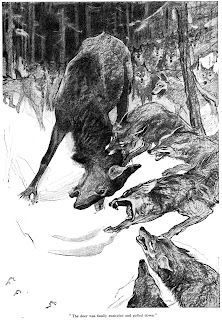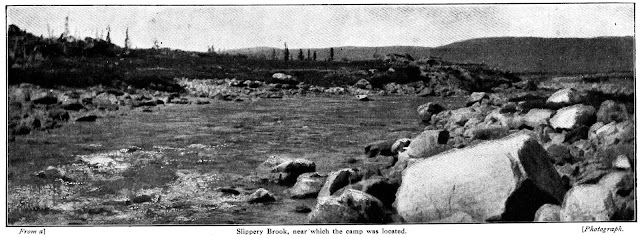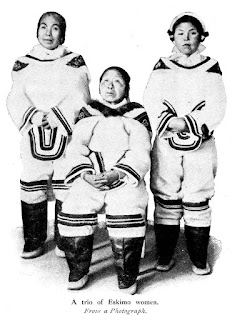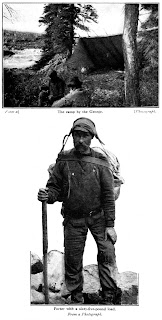By Jno A. Hope.
Illustrated
by Warwick Reynolds.
From The Wide World Magazine June 1911, Vol. xxvii.—17.
A rousing account of sport with rifle and snow-shoe in the great forests of
Canada. In the school of wood-craft and cunning, says the author— himself a
veteran hunter—the wolf has no four-footed equal. Mr. Hope describes the happenings of a three months’ hunt in
the winter of 1908-9.
It is only in recent years that the great, gaunt, grey-coated wolf (Canis
lupus)—found throughout the unsettled
portions of Canada, from the Atlantic to the Pacific—has come to be regarded by big-game hunters as a sporting animal.
“And,” they very pertinently ask, “why not? Did not the Kings of France and
England, centuries ago, keep great packs of hounds specially bred and trained
to hunt wolves for sport? And do not sportsmen hunt them, in various ways, in
several European countries to-day? Moreover, have we any animal harder to see,
to outwit, to outmanoeuvre and shoot, than the wolf?”
Certainly not here in North America. Hunting wolves from horseback
behind a pack of nondescript dogs is, of course, not a new sport on our vast,
level prairies of the West. But in the still vaster forested regions of
Northern Quebec and Ontario wolf-hunting as a sport is in its infancy; and here
horse and hound must give place to rifle and snow-shoe in a rough, rugged
country, intersected like a chequer-board by innumerable lakes, rivers, and
streams, covered with from two to three feet of snow, and with the thermometer
anywhere from ten to thirty degrees below zero. Therefore plenty of stamina and
endurance is required to face these conditions, with a keen interest in the
sport—more especially as wolves in numbers must be sought for well back
in the deep, silent forests, miles from the nearest railroad or settlement. Men with these qualifications are not numerous.
 By many people wolf-hunting is considered a science. At the end of
twenty-seven years hunting of various kinds of big game, including the wolf, in
different countries, I have no reason to dispute this statement. It matters not
what method one employs to hunt wolves in a forested or mountainous country,
stratagem and cunning must be freely used to outwit cunning—combined as it is with faultless
wood-craft and extreme cowardice—when trying to get them within range of the sportsman’s rifle.
Only those who make a close study of wolves and their habits throughout the
year can hope for success. All the men in Canada who do this, however, can be
counted on the fingers of one hand.
By many people wolf-hunting is considered a science. At the end of
twenty-seven years hunting of various kinds of big game, including the wolf, in
different countries, I have no reason to dispute this statement. It matters not
what method one employs to hunt wolves in a forested or mountainous country,
stratagem and cunning must be freely used to outwit cunning—combined as it is with faultless
wood-craft and extreme cowardice—when trying to get them within range of the sportsman’s rifle.
Only those who make a close study of wolves and their habits throughout the
year can hope for success. All the men in Canada who do this, however, can be
counted on the fingers of one hand.
In the school of wood-craft and knowledge of how to keep out of
danger wolves have no four-footed equals. The fox is a dunce in comparison, the coyote—or prairie wolf—a fool, and
the rest nowhere. The giant moose, king of the Canadian woods, is the most
difficult of all the deer species to stalk in the fall months; but,
nevertheless, it is often stalked successfully and shot by amateurs. Not so the
wolf. Knowing this, and that true sport must combine a maximum of exertion and
even danger to a minimum of destruction (though nothing would be said about the
destruction of too many wolves), also that there was more honour to be gained
in outwitting and shooting one wolf than a dozen easily-stalked and innocent deer,
the writer organized a wolf-hunt for the winter of 1908-9, built three log-cabins some miles apart, and invited
sportsmen to participate.
During the three midwinter months they came into camp in twos and threes for a week or ten days’ hunt. To all of them the sport was new, healthful, and exciting, not to say dangerous, considering
the quarry sought and the risk of breaking through thin ice on lakes and rivers in its pursuit.
As
soon as the first hunters arrived—in
December—we shot several
wood-hares and ruffed-grouse. These we placed at rocky points round the large
lake, infested with wolves, on which
the cabins fronted. A couple of nights
later half a score of wolves—judging
by the way fur and feathers,
legs and wings, heads and tails, were scattered over a wide area of the snow-covered ice, punctuated
in between with thousands of their footmarks—must have had a glorious scrimmage
over these dainties; yet not a particle of either grouse or hares had been
eaten! This was subsequently repeated on several occasions, which goes to
disprove the hitherto accepted statement that “wolves are always hungry”—at least, they are not here in
Canada.
Some three days later, while coming down the lake at midday from
No. 3 camp, a ringing chorus of “yi-ki-hies” burst on our ears; from among the
timber-covered ridges some half a mile away on our left. It came from a pack of wolves in
full cry after a deer.
The writer, an old fox-hunter, could distinguish no difference
between these wild hounds giving tongue under the arches of a virgin forest far
from civilization, and the civilized foxhounds of his youth making merry music
in the British Isles. Presently they gave tongue only intermittently; then the
sounds ceased altogether. They had killed, we decided, and so continued on our
way, which was in the same direction, as the pack were running.
 We were mistaken, however, in
supposing they had killed the deer, for on rounding a point a few minutes later
we noticed, at the distance of about fourteen hundred yards (being a thousand
feet above sea-level the air is rarefied and clear, therefore objects appear closer
than they really are), a dark-grey animal come out from among the trees and
move along the edge of the lake. Almost immediately it was followed by another
and another, until fourteen of what subsequently proved to be wolves were moving
round the lake in single file.
We were mistaken, however, in
supposing they had killed the deer, for on rounding a point a few minutes later
we noticed, at the distance of about fourteen hundred yards (being a thousand
feet above sea-level the air is rarefied and clear, therefore objects appear closer
than they really are), a dark-grey animal come out from among the trees and
move along the edge of the lake. Almost immediately it was followed by another
and another, until fourteen of what subsequently proved to be wolves were moving
round the lake in single file.
For years, in all parts of Canada and the Western States, I had
heard wolves howl and give tongue; but here was the first pack I had ever seen
in plain view. For fully two minutes we crouched behind the snow-covered rocks
on the point and watched them. Between us and them was a deep, wide bay, so
that there was no way of getting to them without being seen. The range was too
far to make accurate shooting, and the intense cold gave us notice to move on.
What should we do?
“Walk straight towards them,” suggested one sportsman, “and see if
they will attack us.”
This speculative policy was agreed to and acted on. Advancing
towards them across the bay, they took no notice of us for the first hundred
yards. Then they suddenly bunched together, sat up on their haunches, and
watched us intently. Wondering what they would do, we continued our advance.
Would they really attack us—as all kinds of backwoods literature, white men, and Indians said
they would—or seek cover?
In less than thirty seconds our doubts on that point were set at
rest. Six of the bunched-up animals got off their haunches and, springing clear
of the rest, headed straight towards us. The others quickly tailed on behind,
and down they came in long, low, steady jumps that carried them over the level
ice with a speed and swiftness I had not credited them with possessing.
As they approached they spread out like a lady’s fan, so as to
outflank and encircle us. This, though distinctly disconcerting, was nothing
compared with the deadly silence they maintained throughout, and which unnerved
us much more than their sudden attack had done. Every moment we expected they
would burst into merry music, as they had been doing only a short twenty
minutes before among the timbered ridges; but evidently wolves, when in sight
of their prey, run it down in perfect silence.
“Curse the brutes!” muttered someone. “Why don’t they give tongue,
or even howl?”
Such a course would certainly have relieved our nervous tension.
As it was, all the blood-curdling stories. I had ever read or heard about
wolves flashed through my mind. But did they know we were men, or had they
mistaken our three indistinct figures, so far away, for deer? Seconds would now
decide the question. Down went our small packs, snow-shoes were kicked off, and
cartridge-belts pulled round to be handy for instant use.
Glancing up, I noticed that they had covered half the distance,
though hardly a minute had elapsed since they had started—a good twelve hundred yards away. At
five hundred yards or so we could not only see how swiftly and smoothly, with a
hardly-perceptible up-and-down motion, they could get over level ice or ground,
but also their mode of surrounding and pulling down their prey. For they were
bearing down like the Spanish Armada, in the shape of a half-moon, the two
outer points of which were three hundred feet apart, and widening as they came.
At three hundred and fifty yards the white teeth and gleaming eyes
of a large dog near the centre caught and held my attention. Being in the
middle of my companions that dog— according to the code of field sports—was mine. “Don’t shoot until
they are close up,” I whispered; “then each of you attend to the outer wings.”
 I had thrown my powerful Mauser forward to align the sights on the
big dog when the whole pack suddenly wheeled round, without stopping, and
headed at full speed back the way they had come. My bullet, however, caught the big dog as he turned, nearly cutting him in two, while
a second sprang high in the air, shot dead by the rifle on my left. Two more
dropped under the rapid fire, just as they had straightened out for the “home
run.”
I had thrown my powerful Mauser forward to align the sights on the
big dog when the whole pack suddenly wheeled round, without stopping, and
headed at full speed back the way they had come. My bullet, however, caught the big dog as he turned, nearly cutting him in two, while
a second sprang high in the air, shot dead by the rifle on my left. Two more
dropped under the rapid fire, just as they had straightened out for the “home
run.”
One, with its hind leg broken, got up again and limped after the rest, but a second bullet put it out of pain.
The remainder, with heads well down, to escape the showers of frozen snow and ice that the high-power
bullets ripped up and sent over them at five, six, and seven hundred yards,
sped back with the same long, low, smooth bounds that quickly carried them to
the edge of the woods, into which they disappeared.
Curiously enough, even when badly wounded they never once uttered
a sound.
Whether they charged
down at us as human beings or deer is a problem difficult to solve. Taking into
consideration, however, their wheeling round so quickly, with an unmistakably
crestfallen air, and before a shot was fired, and the fact that we were carrying
small packs strapped to our backs and wearing whitish-grey Eskimo
hunting-shirts, and were also forcing our way with bent bodies against a sharp
wind driving a slight flurry of snow, I incline to the latter belief; otherwise
they would have charged home. Built for strength and speed, this strong
pack—above the average in numbers— could have torn the three of us to pieces in as many seconds. Therefore I
maintain—and I have no reason to change my opinion either from former
experience or since—that, for once, a pack of wolves had really charged three men in
mistake for deer.
 It mattered not which cabin we occupied, we were at some part of the night “serenaded” by long, dismal howls of one or more wolves. And let me
say here that a wolves’ “concert” held at night in the dark, gloomy
pine-forests of Canada is the most spirit-depressing music ever listened to.
Even when shut up securely in a cabin, it sends a cold shiver of some impending
calamity through the frame of the stoutest man.
It mattered not which cabin we occupied, we were at some part of the night “serenaded” by long, dismal howls of one or more wolves. And let me
say here that a wolves’ “concert” held at night in the dark, gloomy
pine-forests of Canada is the most spirit-depressing music ever listened to.
Even when shut up securely in a cabin, it sends a cold shiver of some impending
calamity through the frame of the stoutest man.
One night, about ten o’clock, at No. 2 camp, a longer and more
dismal howl than usual broke the quiet stillness of the surrounding woods, lit
up by countless thousands of sparkling stars and a bright moon, nearly at the
full. The howl came from the point of a peninsula nearly a mile distant across the
lake. Instantly from a ridge behind and to one side of the cabin, came a short,
sharp answering howl. The echoes had barely died away when from the same
quarter of the ridge the main pack broke into a chorus of “yi-ki-hies” that
sounded like a volley of rifle-shots. Then down they came past the cabin and
out on to the lake.
Opening the cabin-door let in a volume of yelps so deafening that
for the moment we thought the cabin was full of tongue-giving wolves. But, looking
across towards the peninsula, we could see about a dozen swiftly-moving black
dots out on the ice, which lay shimmering like molten silver under the bright,
frosty moon, the “yi-ki-hies” becoming fainter and fainter after they had
passed under the shadows cast by the tall conifers on the peninsula, finally
dying away completely.
That the long, dismal howl of the lone wolf had carried a message—even if unintelligible to man—to the main pack there could be no
doubt, and to this the clean-picked skeleton of a deer, found on the far side
of the peninsula the next morning by following their trail, clearly testified.
And this trail, after it entered the woods, proved to be very interesting from the
fact that it showed only too plainly that the instinct of these wild hounds in
knowing how to outmanoeuvre, surround, and pull down their prey is infinitely
superior to that of the trained hound. Although, as
I have tried to point out, wolves are possessed of wonderful speed, they depend
more on their brains than their legs, for while part of the pack had stopped behind
to drive the deer forward, the rest had outflanked it to right and left,
forcing it to
go in the direction wanted, when the deer
was finally encircled and pulled down. I venture to say from
experience that no pack of domestic hounds ever
bred and trained by man can run down their quarry as quickly and intelligently
as do these wild hounds from their own natural instinct.
It was about midnight when we lay down on our bed, composed of
balsam and pine needles —but not to sleep; we were too excited after witnessing such a
novel hunt in the moonlight. Instead, therefore, we lit our pipes, put out the
light, and lay smoking and discussing wolves and their habits for over an hour,
when suddenly our conversation was interrupted by a prolonged shrill scream,
ending in a caterwauling “meow.”
 Before I had-time to explain that it came from the great Northern lynx (Felis canadensis), its mate
answered from somewhere near by the cabin, which brought us sharply to our
feet. I was just in the act of lighting a match when again came the shrill
scream, answered, not by its mate, but by wolves, singly, in pairs, and all
together, from several parts of the lake.
Before I had-time to explain that it came from the great Northern lynx (Felis canadensis), its mate
answered from somewhere near by the cabin, which brought us sharply to our
feet. I was just in the act of lighting a match when again came the shrill
scream, answered, not by its mate, but by wolves, singly, in pairs, and all
together, from several parts of the lake.
“Merciful
powers!” exclaimed one of my companions, nervously. “I’d rather be out on the
lake than shut up in here listening to such weird, mournful brutes. It makes
one think of death and the grave” —which
explains the feeling created better than the writer can.
As
trying to sleep was out of the question, I suggested dressing again and walking
across to the peninsula to see if they had more courage to attack us at night
than they had in daylight. Being very still, freezing hard, and bright as day, one could see to shoot perfectly. We had not advanced very far out on the ice when every howl ceased. That all the keen-eyed brutes saw us, however, was quickly made apparent, for presently a sharp “wouff-wouff” came
from an unseen brute on a point slightly behind and to one side of us. Then another, in
the same key, from the peninsula, followed by
others, until one grand chorus swelled up from the weird orchestra.
When we were back near the cabin one of my companions—a New York gentleman—suddenly faced round and emptied his magazine rifle at the nearest point, exclaiming
angrily as he did so: “You cowardly brutes! You keep our nerves on the rack all night, and
when we come out and challenge you to fight it out, you won’t show a hair!”
It was very tantalizing, certainly. Complete silence followed the
rifle-shots, however, and we slept peacefully until late in the morning.
A few days afterwards my two companions left for home, and three fresh
hunters arrived in their place. Then what I had been waiting for set in—a January thaw! I could now make a blood-trail, and see if
wolves would follow it, as if they did the problem of how to get them within accurate rifle-range
was solved.
 The blood of a dozen wood-hares (locally, rabbits) made a trail
about two thousand yards in length, running past two points jutting well out and across the bay fronting
on No. 2 cabin, and finishing at a point some three hundred yards away, in plain
sight from the door. Two mornings later, the weather keeping soft and our taint
having gone from along the trail, we were awakened from a sound sleep by what
sounded at first like a band of music, but which turned out a moment later,
when we were fully awake, to be a troop of ten wolves giving tongue.
The blood of a dozen wood-hares (locally, rabbits) made a trail
about two thousand yards in length, running past two points jutting well out and across the bay fronting
on No. 2 cabin, and finishing at a point some three hundred yards away, in plain
sight from the door. Two mornings later, the weather keeping soft and our taint
having gone from along the trail, we were awakened from a sound sleep by what
sounded at first like a band of music, but which turned out a moment later,
when we were fully awake, to be a troop of ten wolves giving tongue.
Rushing to the little window and
looking out we could see them as they swept across the bay on the blood-trail,
in extended order. Being well within range, we managed to get in a dozen or so
shots before they rounded the nearest point. But this was because one of us ran
down to the edge of the ice and whistled sharply. Thereupon the whole band
stopped for a moment to investigate the unusual sound. That investigation cost
them two of their number, and started the rest off at full speed for the
nearest cover. Before they reached it, however, a third dropped, rolled over,
got up, and then lay down for good. Subsequently several more were shot on
other blood-trails; but further details would only be a repetition of the
foregoing.
Measuring and weighing the wolves secured—the animals are shown in the
photographs— they were found to average eighty-seven pounds in weight, six feet
from nose to tip of tail, and to stand twenty-eight inches at the shoulder;
which is a fair average size and weight for the timber-wolf found throughout
Canada.










